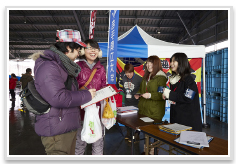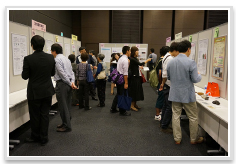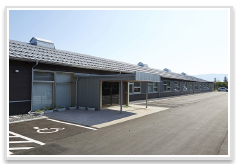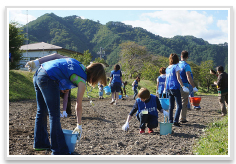- Implementation of the midterm plan and promotion of reconstruction efforts in Iwate
- Major Project Achievements for Academic Year 2013
The 2013 academic year was the third year of the second phase midterm plan. In addition to the steady advancement of the midterm plan, we developed a 2013 academic year plan that also incorporates the recovery-support efforts.
For the recovery of Iwate prefecture, we have promoted planning focused on a 6 Priorities Plan. The entire university has been united in carrying out activities in support of reconstruction in order to respond to expectations of our students and the community as a university that contributes to both core human resources development and the generation of vitality in the region.
① Acquisition of new students that have a strong sense of purpose and passion for learning
■ Enhancement of cooperation and system for implementation of collaborations between high schools and the university
We established “the commission of preparation for collaboration between high schools and the university” as a working organization in which the teachers of high schools and the university participate through the cooperation of association of principals of prefectural high schools. We looked for the problems which should be shared between high schools and the university such as the way of collaboration.
■ Economic and academic assistance for aspiring students affected by the disaste
As reductions or exemption in entrance fees and tuition fees of affected students have continued, the new scholarship system “special quota of affected students” was established and bounties were paid for 6 affected students. “Special entrance examination” was continuously applied with making a shift to “Special admission based on recommendation”
■ Acquisition of aspiring graduate students
We have decided reductions or exemption in entrance fees of graduate school from the academic year of 2015 students who graduated our university in order to increase the number of students who go on to the graduate school. In faculty of Software and Information Science, the entrance examination could be taken in the Dalian Jiaotong University. The application requirements for on-campus admission based on recommendation were changed in faculty of Social Welfare.
② Execution of a systematic and consistent education program
■ Reformation of basic education by the Center for the Advancement of Higher Education
To expand the basic education which enables to find the problems on one’s own initiative and develop the ability for problem solving, the way of reformation of basic education program was admitted by all faculties. After that, we established “the Task Force of subject reformation of problematic and logical approach” and the ideas of reformation were organized and reflected it to the curriculum changes in 2014.
■ Systematization of three policies
Due to formulation and announcement of the diploma Policy of each faculty, graduate school, and junior college and curriculum policy which is arrangement of educational course and its application, a consistency with admission policy was checked and systematization of three policies were planned.
■ Effective management by Introduction of new academic assessment system
New academic assessment system was officially introduced and the criteria of academic assessment were shared among faculty meetings in each department. About the data of “average GPA of department”, “academic assessment for each subject and class” and “withdrawing submission status”, academic affairs and FD promotion committee discussed the data contents and the way of utilization.
③ Supporting the development of student employability and promotion of employment within the prefecture
■ Smooth Operation of the IPU-E Map system
In the faculty of Policy studies, a system of self-assessment of employability using IPU-E Map (students’ self-assessment of employability) has been implemented regularly. In the Faculty of Software and Information Science and Morioka Junior College, we have advanced to a trial for understanding individual specialty and activities related to career design.
■ Development of systematization of career courses and the structure of career course
By invitation for employing supporter companies, we replenished the companies which accept the internship and also students can earn the credits by internship to incorporate to the career education system. We promoted the employability support project using “Improvement of education and enhancement of system development projects to respond to the needs of industry” (adopted by MEXT) and we implied to improve work awareness by operating job shadow and IPU-E project (business to support students to acquire employability by their own designing skill and ability to take action.
■ Promotion of understanding prefectural businesses and enhancement of civil service examination course
We proactively held integrated career forum that multiple prefectural companies participated and research seminars of hospitals. For preparation of the civil service exam, we took place practice exam and career guidance for civil service for freshman and sophomore as well as the early opening of civil service lectures and enhancing the contents of lectures.
 “Hamagiku” which was adopted as IPU-E project
“Hamagiku” which was adopted as IPU-E project
 Iwate Prefectural University Presentation of Research Results
Iwate Prefectural University Presentation of Research Results
④ Carrying out research that is valuable to the region and publically disclosing the results
■ Promotion of research into local challenges
Regional joint research and faculty projects by Regional Policy Research Center, the research for solving the local challenges including the reconstruction from disaster, for instance, health support activity at affected area, factual investigation of social welfare facility in affected area, research for prevention of disaster, and support for reconstruction of the town.
■ Holding the Presentation of Research Results
In September, “Iwate Prefectural University Presentation of Research Results”was held and our variety of research activities were disclosed to public.
[General section] Lectures: 16 titles, Panel Presentation: 33 titles
[i-MOS section] Lectures: 11 titles, Panel Presentation: 31 titles
[Center for Regional Policy Studies section] Lectures: 15 titles, Panel Presentation: 30 titles
■ Improvement of the scientific research grant application and selection rate
We offered effective information about scientific research grant through mailmagazine and invited the lecturer from Japan Society for the Promotion of Science to hold on-campus seminar. Moreover, we set up “Blush-up Grants-in-Aid” by using the budgets in 2014 which is received in the case of instruction by the guest lecturer.
⑤ Strengthening collaborations between industry, academia and government, and making full use of think-tank functionally
■ Promotion to deal with regional problems such as earthquake disaster reconstruction and disclosing the results
As continued projects from the second term of the year of 2012, 8 topics of local community proposition type and as new projects from the year of 2013, 15 topics in the first term and 8 topics in the second term of faculty proposition type and 13 topics in the first term and 9 topics in the second term of local community proposition type were selected and the researches were proceeded. As for the finished research topics, we made reports and delivered to each city in the prefecture and the proposition groups of regional joint research.
■ Engineer training and product development at i-MOS
We leveraged the "Center for the next Generation Mobility Technology Development that is Friendly to Human and Environment" and promoted joint research between industry, academia and government centered on the automotive industry. For high-level engineers, we held 13 courses of 15 workshops which satisfy the needs of participants.
■ Support the companies for business advances and promotion of joint research
There are 17 companies which are going to move into Innovation Center and Secondary Innovation center (opened in May, 2014) due to the response with Takizawa city such as preparing the opportunities to exchange information between faculty staffs to give some advices to the companies. Joint research has been also promoting with already moved in companies in the year of 2014.
■ Promotion of Supports for Reconstruction
As well as we promoted the support for reconstruction by providing transit service for volunteers at Disaster Reconstruction Support Center in Iwate prefectural University, we donated the expenses for the volunteer activity by the faculty staffs. Mizubora (Rikuzentakata) and Nanohana (Otsuchi) projects were implemented through the volunteering works by the interaction with University of Ohio besides the scholarship students from Honjo International Scholarship Foundation.
⑥ Development of teaching staff who contribute to the realization of the ideals of the university
■ Promotion for improvement of educational skill
While reviewing “the student questionnaire about the lectures”, the system for amelioration of the lectures was consolidated by accelerating implementation of intermediate survey and feedback of the results. For all subjects, mutual audit between teachers could be available and we organized the time schedule so that each teacher can listen in more easily.
■ Application of the system of specially approved visiting faculty member
Three specially approved visiting professors were adopted by applying of the system of specially approved visiting professor.
■ Designing the vision and plan for human resource cultivation and promotion of development of teaching ability for teachers
We designed the vision and plan for human resource cultivation in order to improve the ability of bureau staffs and supporting self-development. For instruction of newly adopted staffs, OJT is used to cultivate in each office and group.
 Takizawa-IPU Secondary Innovation Center
Takizawa-IPU Secondary Innovation Center
 Supporting Reconstruction for affected area through the interaction with University of Ohio
Supporting Reconstruction for affected area through the interaction with University of Ohio




